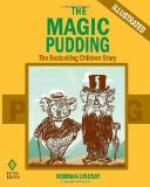At length he decided to put the matter before Egbert Rumpus Bumpus, the poet, and ask his advice. He found Egbert busy writing poems on a slate. He was so busy that he only had time to sing out,
“Don’t interrupt the poet, friend,
Until his poem’s at an end,”
and went on writing harder than ever. He wrote all down one side of the slate and all up the other, and then remarked,
“As there’s no time to finish that,
The time has come to have our chat.
Be quick, my friend, your business state
Before I take another slate.”
“The fact is,” said Bunyip, “I have decided to see the world, and I cannot make up my mind whether to be a Traveller or a Swagman. Which would you advise?”
Then said the Poet—
“As you’ve no bags it’s plain to
see
A traveller you cannot be;
And as a swag you haven’t either
You cannot be a swagman neither.
For travellers must carry bags,
And swagmen have to hump their swags
Like bottle-ohs or ragmen.
As you have neither swag nor bag
You must remain a simple wag,
And not a swag- or bagman.”
“Dear me,” said Bunyip Bluegum, “I never thought of that. What must I do in order to see the world without carrying swags or bags?”
The Poet thought deeply, put on his eyeglass, and said impressively—
“Take my advice, don’t carry bags,
For bags are just as bad as swags;
They’re never made to measure.
To see the world, your simple trick
Is but to take a walking-stick
Assume an air of pleasure,
And tell the people near and far
You stroll about because you are
A Gentleman of Leisure.”
“You have solved the problem,” said Bunyip Bluegum, and wringing his friend’s hand, he ran straight home, took his Uncle’s walking-stick, and, assuming an air of pleasure, set off to see the world.
He found a great many things to see, such as dandelions, and ants, and traction engines, and bolting horses, and furniture being removed, besides being kept busy raising his hat, and passing the time of day with people on the road, for he was a very well-bred young fellow, polite in his manners, graceful in his attitudes, and able to converse on a great variety of subjects, having read all the best Australian poets.
Unfortunately, in the hurry of leaving home, he had forgotten to provide himself with food, and at lunch time found himself attacked by the pangs of hunger.
“Dear me,” he said, “I feel quite faint. I had no idea that one’s stomach was so important. I have everything I require, except food; but without food everything is rather less than nothing.




